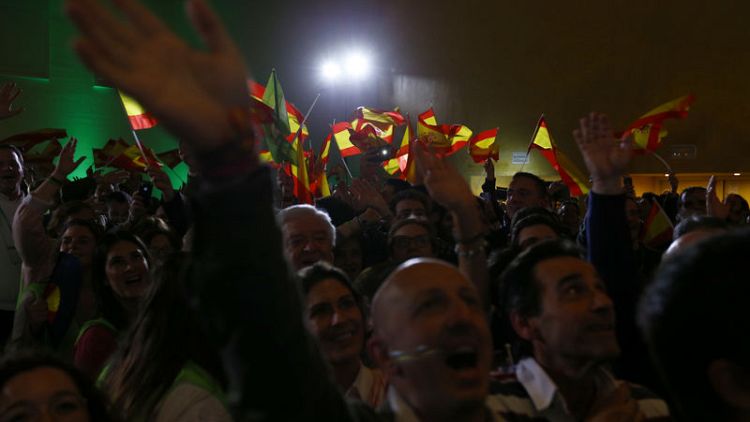By Ingrid Melander and Belén Carreño
MADRID (Reuters) - Buoyant right-wingers and downcast Socialists agreed on one thing on Monday in Spain: politics will not be the same again after the surprise election in Andalusia's regional parliament of 12 far-right lawmakers.
Andalusia kicked off a busy electoral season on Sunday by delivering the Socialists an unexpected blow and handing over to the far-right Vox a regional kingmaker role long unthinkable in a country with memories of military dictatorship still acute.
With a spate of local, regional and European elections slated for May, parties jostled to take the lead in the changing landscape after the inconclusive outcome in Andalusia, where Prime Minister Pedro Sanchez's Socialists could lose control.
"This is just the beginning," Pablo Casado, the new, national leader of the conservative People's Party (PP), told a news conference. "Spain has had enough."
Lessons from Andalusia's vote are that the far-right surge, an increasingly fragmented political scene, and deepening polarisation, especially over matters of regional autonomy and immigration, are here to stay, analysts said.
"What happened on Sunday changes everything," said Narciso Michavila, head of GAD3 pollsters, who had forecast the election of Vox lawmakers but said the fact that as many as 12 got seats in Andalusia's assembly was an unexpected game-changer.
Surveys show voters on both sides of the left-right divide used the Andalusia election to send Sanchez messages on national politics - ranging from his overtures to Catalan nationalists that some judge to be too lenient to a desire for snap general elections, according to Michavila.
A senior Socialist official from Andalusia concurred. Speaking on condition of anonymity, he blamed what he called the government's "tepidness" on Catalonia for keeping the party's voters at home in a region that is usually a party stronghold.
Sanchez has said he is open to a referendum on greater autonomy for Catalonia and has promised to lay out detailed plans in parliament on Dec. 12. Catalonian nationalists' bid for independence is a very divisive issue in Spain.
"DECISIVE"
"What happened here will be decisive for the rest of Spain," Vox leader Santiago Abascal told a news conference.
He projected fresh ambitions for a party that so far operated on the fringe of Spain's politics but benefited from fatigue with mainstream parties, fears for Spain's unity and about immigration. Andalusia has borne the brunt of a migrant wave from North Africa across the Strait of Gibraltar.
Vox's electoral success on Sunday was the first for the far-right since Spain's return to democracy in the late 1970s.
But the anti-immigration party, which opposes giving regions more power in what is already one of Europe's most decentralised country, can now target wins in more regions and municipalities when Spaniards go back to the polls in May 2019.
"I am convinced Vox can get people elected in all the municipalities and regions where it will present candidates," said Pablo Simon, a political science professor at Madrid's Carlos III University. "Spain now has a multi-party system with a far right like other European countries."
Government officials said the Andalusia election convinced them to stick to their policies rather than change them, and Sanchez insisted he would keep his party on a pro-Europe track.
An important question will be if, and when, Sanchez, who leads a minority government, could call early general elections, ahead of the 2020 scheduled date.
Vox Vice-President Victor Gonzalez told Reuters he was in no rush, as he was convinced his party was only starting to grow.
"If there are elections now we would have less seats than in 2020," he said.
There are still many unknowns, not the least of which being who will eventually govern Andalusia, with negotiations just starting.
While a union of the right, with Vox backing the People's Party and the centre-right Ciudadanos, seemed most likely, analysts said, an alliance with the far-right could complicate Ciudadanos' European ambitions.
(Additional reporting by Rodrigo de Miguel, Paul Day, Marco Trujillo; Writing by Ingrid Melander; Editing by Mark Heinrich)
